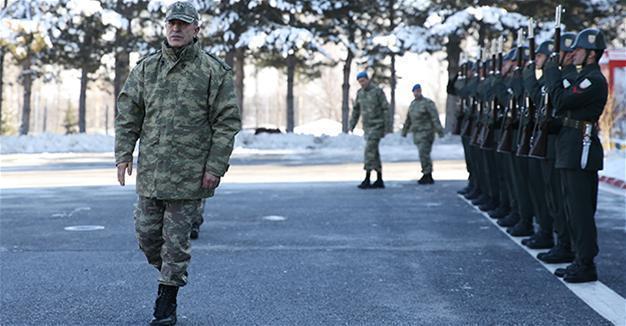Parliamentary panel addresses 10 questions to top Turkish general on coup, abduction
ANKARA

AA photo
A parliamentary commission investigating the July 15 coup attempt has directed 10 questions to Chief of Staff Gen. Hulusi Akar, who was abducted by putschist soldiers during the foiled attempt before being saved together with other members of the top brass, according to broadcaster NTV.The questions are as follows:
- How did you learn about the coup attempt?
- Was there intelligence submitted to you from the National Intelligence Organization (MİT) about suspicions of a coup attempt or an attack on the MİT?
- Did you contact the private secretaries of the Prime Ministry or the Presidency upon receiving this intelligence?
- During your term in office, have you received any report that considers the Fethullahist Terror Organization (FETÖ) or the Parallel State Structure (PDY) as a threat?
- Have you discovered any FETÖ/PDY members during your term in office? Did you a request a report from MİT in this regard?
- What is the most important reason why you did not notice the infiltration of FETÖ members into the Turkish Armed Forces (TSK)?
- Can you tell us about how you were incapacitated and taken to the Akıncı Air Base and Çankaya Palace?
- Was your neck squeezed with your belt?
- How do you evaluate the statements of Mehmet Dişli [a coup-plotting general] that he was there with you?
- How were you rescued from the Akıncı airbase?
MİT informed the country’s top generals hours before the coup attempt was initiated by a group of soldiers on July 15, while Akar evaluated the information and issued all necessary warnings and orders against “this despicable and miserable attempt,” according to a statement published on the General Staff’s official website on July 19.
Akar has not yet provided answers to the questions.
34 Turkish military personnel detained in Gülenist probe
Turkish police on Dec. 28 detained 34 military personnel in an ongoing investigation into the Gülenist organization that is widely believed to be behind the failed July 15 coup attempt in Turkey.
The Ankara Public Prosecutor’s Office issued arrest warrants for the military personnel, including commissioned and non-commissioned officers, on charges of being members of a “terrorist organization.”
A prosecutor’s statement added that 26 of the detainees were Turkish gendarmes. Five other suspects were land force officers, two were marine officers and one was from the air force.
Those detained were held across 22 provinces.
Meanwhile, the second hearing of the first July 15 coup attempt case in Istanbul took place on Dec. 28 with the participation of 26 police suspects who are charged with attempting to abolish the constitutional order during the failed takeover bid and being a member of the Gülenist organization, when they refused to protect the Turkish president.
The trial, which is being heard at a courthouse in the Silivri district of Istanbul, began with the judges hearing arrested suspect Adil Tiftik.
Tiftik denied the charges, saying he was at home when the coup activities began and learned about the attempt on TV.
The suspect said he did not receive instructions at any time of the night as his chiefs knew that his child was sick and that he had to take care of him.
Tiftik said that after his child’s fever decreased, he voluntarily went in the early morning to the Sarıyer district police headquarters and discussed the incidents of the night with his colleagues. He added that he went to the station even though he was on leave.
“At 8 a.m. I was positioned at Huber Mansion. I went there and stayed until late hours. I did not go to anywhere else and I performed my duty,” said the suspect.
The 29 are accused of declining to implement the order to go to Huber Mansion on the night of the events to protect President Recep Tayyip Erdoğan and are also accused of declining the demands of the people, who took to the streets against the coup.
According to the indictment, 21 defendants face three aggravated life sentences each on charges of attempting to abolish the constitutional order, prevent the work of the parliament and dissolve the government. The eight remaining officers face prison sentences ranging from nearly eight years to 15 years on charges of membership in the Gülenist movement.
















